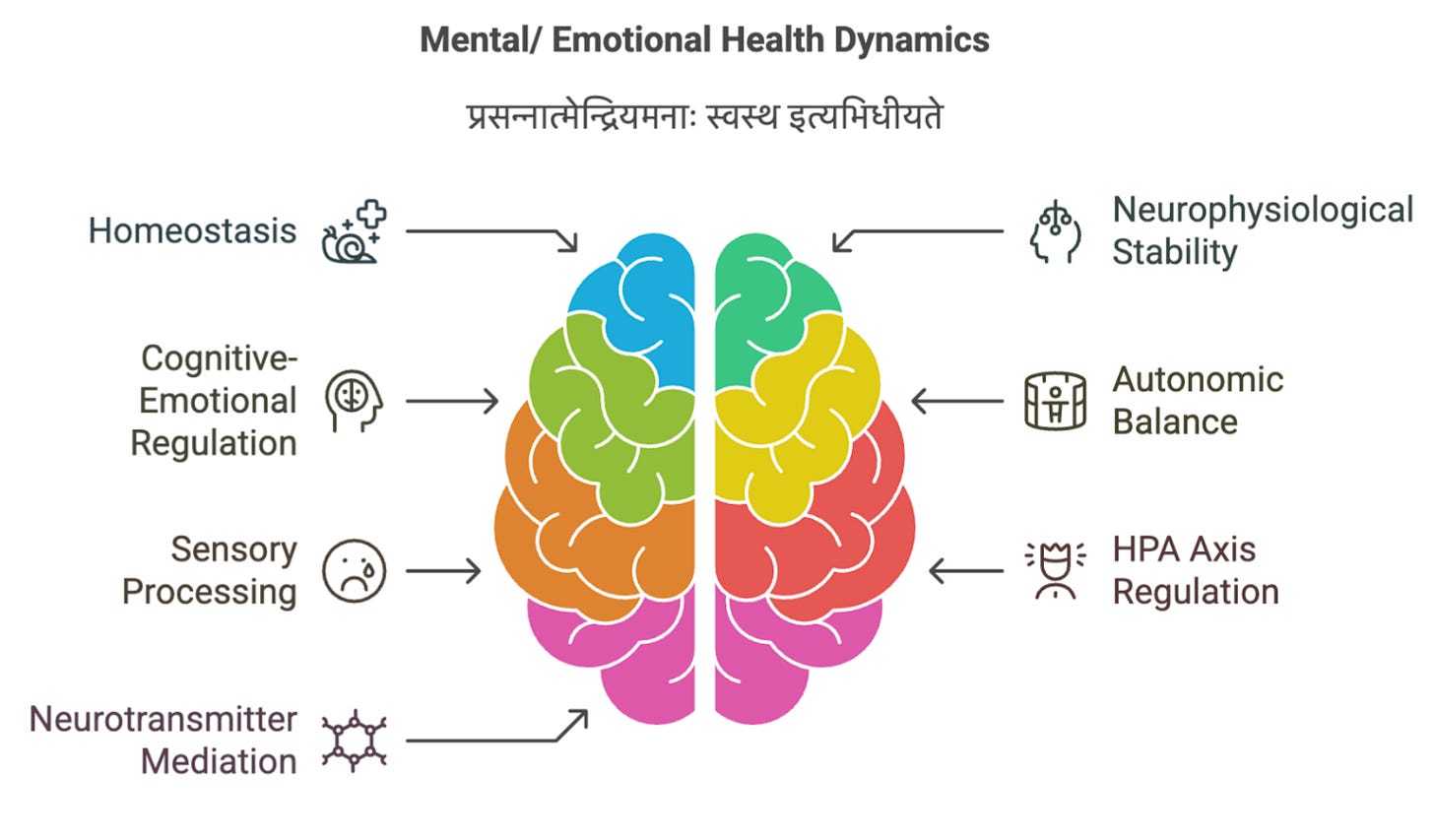Emotional Health Care in Ayurveda
Ayurveda Post | Issue #19 (February 2025)
In today’s fast-paced world, emotional health is often overshadowed by physical wellness, yet it is the true foundation of a fulfilling life. Our emotions shape our perceptions, influence our relationships, and determine our capacity to handle stress and adversity.
Ayurveda views the mind (Manas) and emotions as integral to overall well-being. It recognizes that emotional health is not merely the absence of distress but a state of inner harmony, resilience, and clarity. It offers powerful tools-from herbs and therapies to daily routines, diet, and meditation-to cultivate emotional stability and elevate the mind to a state of balance.
This special edition of Ayurveda Post, in recognition of Emotional Health Day on February 24, 2025, takes you on an enlightening journey through Ayurvedic insights into emotional wellness. From decoding Sattva, Rajas, and Tamas to exploring natural remedies for stress, anxiety, and mental fatigue, we bring you profound, practical, and research-backed Ayurvedic solutions to enhance your emotional well-being.
Prof. Abhimanyu Kumar (Chairman & CEO)
Centre for Ayurveda Education, Innovation & Technology (CAYEIT) - ak@cayeit.com
Ayurveda and Emotional Health: The Missing Link in Modern Healthcare
Emotional well-being is not merely the absence of mental illness; it is a dynamic state of inner balance where one experiences clarity, purpose, and joy. Ayurveda recognizes Sattva, Rajas, and Tamas as the three fundamental qualities (Gunas) influencing the mind.
Sattva (Purity & Harmony) -Leads to clarity, wisdom, and emotional stability.
Rajas (Activity & Desire) -Fuels ambition but can cause stress, anxiety, and restlessness.
Tamas (Inertia & Ignorance) -Associated with dullness, depression, and confusion.
By nourishing Sattva, balancing Rajas, and reducing Tamas, one can achieve mental clarity, emotional resilience, and overall well-being.
The Ayurveda Blueprint for Emotional Resilience
In the chaos of modern life, emotional health often takes a backseat, leading to stress, anxiety, and burnout. But what if the key to emotional stability lies in the Ayurvedic connection between the mind and body? Ayurveda teaches that our emotions are deeply influenced by Dosha balance, digestive health, and daily rituals- offering powerful solutions through herbs, lifestyle, and meditation. Want to discover how to harmonize your emotions naturally? Read More
Achara Rasayana: The Ayurvedic Code for Emotional Well-being
True emotional resilience is not just about managing stress but cultivating a lifestyle that nurtures the mind and soul. Ayurveda’s Achara Rasayana (behavioral rejuvenation) offers timeless wisdom on how ethics, mindfulness, and daily conduct shape emotional health. Explore how simple yet powerful lifestyle shifts can transform your mental and emotional state. Read More
Emotional influences on food choice: Sensory, physiological and psychological pathways (Edward Leigh Gibson. Physiology & Behavior. Volume 89, Issue 1, 30 August 2006, Pages 53-61) : Food is more than just sustenance-it’s emotional fuel. A satisfying meal soothes stress and lifts mood, while an unsatisfying one triggers irritability. Sweet and fatty foods activate dopamine and opioid pathways, offering temporary relief but rewiring cravings over time, leading to overeating and weight gain. They also calm stress hormones, yet paradoxically contribute to belly fat. Those prone to emotional eating or stress sensitivity are most affected. Read More
Memory Control: A Fundamental Mechanism of Emotion Regulation. (Engen, Haakon G. et al. Trends in Cognitive Sciences, Volume 22, Issue 11, 982 - 995) : Memories shape our emotions, bringing both joy and distress while coloring how we see the world. Managing their emotional weight is key to mental well-being, linking memory control to emotion regulation. Understanding how the brain edits, suppresses, or reshapes memories could unlock new ways to regulate emotions. This insight may also explain why memory-related disruptions contribute to psychiatric disorders. Read More
Harnessing the Power of the Mind: A Timeless Ayurvedic Perspective
"प्रसन्नात्मेन्द्रियमनाः स्वस्थ इत्यभिधीयते"(Prasannātma-indriya-manāḥ swastha ityabhidhīyate)– Charaka Samhita, Sutrasthana 1.41
Meaning: A person is truly healthy when the soul, senses, and mind are in a state of bliss.
Charaka's definition of health (Swastha) integrates homeostasis, neurophysiological stability, and cognitive-emotional regulation. It aligns with autonomic balance (ANS), optimal sensory processing, and HPA axis regulation, ensuring systemic equilibrium. Neurotransmitters like serotonin, dopamine, and GABA mediate this harmony, modulating mood, perception, and stress response. Disruptions in these pathways lead to psychoneuroimmunological imbalances, manifesting as disease (Vyadhi). This Ayurvedic principle parallels modern integrative neuroscience and allostatic regulation, defining health as dynamic balance across mind, body, and senses.
Feeling Extreme Emotions? Try a Survival TIPP
Esme Shaller, PhD, Associate Professor of Psychiatry, (UCSF Dept. of Psychiatry and Behavioral Sciences, University of California San Francisco, USA)
Emotional Wellness Toolkit
Emotional wellness is the ability to successfully handle life’s stresses and adapt to change and difficult times. Here are tips for improving your emotional health: Read Here
Let’s spread the message of emotional health together! Share your experiences and insights with us at contact@cayeit.com
Stay tuned for more expert insights, research breakthroughs, and Ayurvedic wisdom in the next edition of Ayurveda Post!
Warm regards,
Ayurveda Post Team









